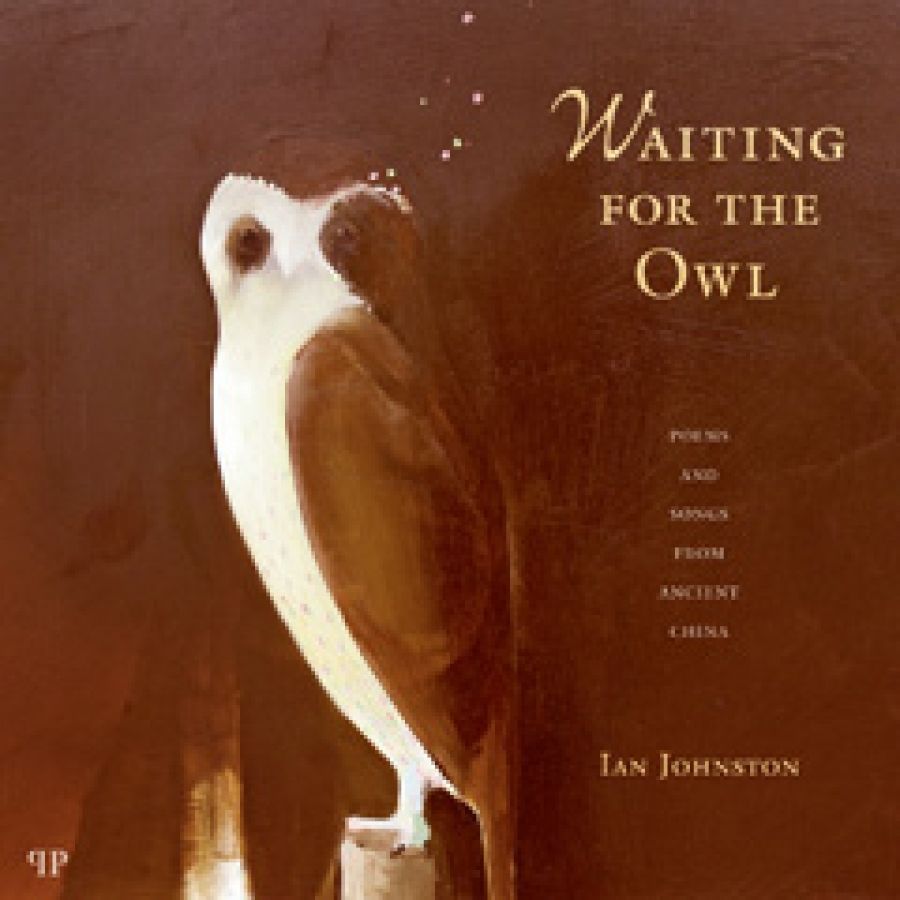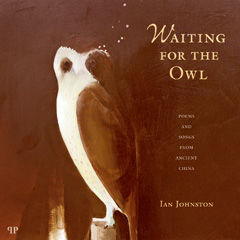
- Free Article: No
- Contents Category: Poetry
- Review Article: Yes
- Article Title: Shores of difference
- Article Subtitle: A master translator in our midst
- Online Only: No
- Custom Highlight Text:
Chinese poetry has long been lost in translation. You only have to look at a line in an ancient Chinese poem and its inscrutability is plain to see: four or five characters across the page, each with several venerable meanings and without markers of tense, speaker, conjunctions or prepositions. Every translator becomes an adventurer, one who can only haul the poem onto the shores of difference.
- Book 1 Title: Waiting for the Owl
- Book 1 Subtitle: Poems and songs from ancient China
- Book 1 Biblio: Pardalote Press, $29.95 pb, 96 pp
- Book 1 Cover Small (400 x 600):

Still, we have something of a grand self-congratulatory tradition of translating from the Chinese. Thanks to a poetic seizure upon the concrete image, there is a modernity narrative which conflates certain ‘translations’ from the Chinese with our own shifting sensibilities. In the middle of the twentieth century, some good poets, post-Poundians with less knowledge of Chinese than their cracked master, applied them-selves creatively. The results were impressive; and it could even be claimed, as William Carlos Williams remarked of Kenneth Rexroth’s work, that the ‘subtlety of lyrical candour’ was a gift from ancient China to contemporary America. What was new, then, became in-separable from a Californian contemporaneity, the fresh, direct speech that, we can now see, manifested American hegemony and its cultural narcissism as much as it did any timeless literary achievement.
On the other side of the Atlantic, the West’s mirror had a different slant. In his famous Poems of the Late T’ang (1965), the English scholar A.C. Graham was unbothered by modernism’s American accent. He opened his claims upon the originals with misleading history. ‘The art of translating Chinese poetry is a by-product of the Imagist movement,’ he declared, ‘first exhibited in Ezra Pound’s Cathay (1915), Arthur Waley’s One Hundred and Seventy Chinese Poems (1918) and Amy Lowell’s Fir Flower Tablets (1921). Except for Waley, the unique instance of a Sinologist who is also a poet, its best practitioners have always been poets or amateurs working on the draft versions of others.’
Leaving aside the fact that the French were translating Chinese poetry before anyone in London was, and that in London H.A. Giles excelled before Waley, it is no more accurate to call Waley a poet than it is to cement him into the Imagist movement. As to the sweeping claim that poets had always been the best practitioners, Graham conveniently sidestepped such major figures as Burton Watson, not a poet, whose 1962 versions of Han Shan had already set a new standard. Graham’s conceits served, of course, to promote himself as the scholar who would deliver the goods – the accurate translation that stood out as ‘a fully achieved poem’ – the kind of thing Pound achieved, Graham opined, by departing ‘considerably’ from sense, and ‘triumphantly’ making the Chinese poem ‘his own’.
Overall, the history of translating Chinese poetry into English is bound up with various aspects of our cultural imperialism. The line between poet-translators and scholar-translators is historically contingent, and it has been overdetermined by the legacy of Pound’s brilliant inventions. Pound might well have been, as Eliot famously remarked ‘the inventor of Chinese poetry for our time’, but that was then. Now we can do with creations that commune with the original less brashly, which give off a sense of deeper commingling, rather than triumphal appropriation.
This is Ian Johnston’s second book of translations. Singing of Scented Grass (2003) was a selection of T’ang poets, most of them well known. It was an invaluable addition to the canon, because amateurs have done so much of it. Johnston, a scholar of ancient Chinese philosophy, put the book out in the years he was translating the works of Mozi, the great opponent of Confucius. So with Waiting for the Owl, which Johnston has done in the years he has been translating Confucius. Owl includes the pre-T’ang poets; it offers a splendid introduction to the great tradition, although they have been mainly selected because Johnston has loved them for so long in the Chinese.
He starts with a poem that Graham showcased by printing the Giles, Pound, Waley and Lowell versions together: Emperor Wu’s lament on the death of his favourite concubine. Johnston gives it the title: ‘To the Tune: Fallen Leaves and the Sad Cicada.’ Wu ruled from 141 to 87 BCE.
No more the rustle of silk sleeves,
the jade courtyard fills with dust.
An empty room, cold and lonely,
fallen leaves piled against the doors.
As long as I yearn for my lost love
how can my burdened heart find peace?
Johnston’s is the plainest, the one that strives least for effects with image or diction. I am also prepared to say that Pound’s is the most dynamically beautiful; and Johnston, I would venture to say, would not disagree; he has never, unlike many scholars, taken umbrage at Pound. But modernist high jinks should be left aside in favour of translations that are accurate, character by character, and which have benefited from a scholar’s fluent immersion in the Chinese commentaries. Once we remove our ideological tendencies in the sphere of taste, Johnston’s might well be the closest to the real thing.
‘Might’ has to remain the operative word, of course. This kind of meditation – a quiet reverie as to what transpires with an intimate poem issuing from an exotic civilisation that thrived before English was spoken – is what the travelling called translation is about. The more transparent our guide, therefore, the better.
It is in this spirit that Johnston offers the reader his versions of ‘The Nineteen Old Poems’, the influential suite that dates from the first or second century CE. As he explains in one of the background notes that enrich this book, the poems initiated themes and technical devices that the T’ang poets were to make more sophisticated. The authors are unknown, but their melancholy tones are familiar.
Turning my carriage, I yoke the horses and leave.
The journey is long, travelling different roads.
The wilderness stretches in every direction:
the east wind strikes the hundred grasses ...
Swiftly a man’s life changes as all things must,
so why consider a glorious name a prize?
This is from poem 11, which Waley ends as ‘Fame is the only treasure that endures’ – a reversal of the true meaning. By reading Johnston, it is possible to resist Waley on several counts, especially his habit of painting Chinese scenes as if they were from Europe’s Middle Ages. On the other hand, it is also the case that Waley often keeps to the patterns of repetitions that are visible in the original, holding to their nature as poems close to being songs. Johnston has preferred to find synonyms, for better and for worse, one might say. His diction can sometimes be less light on its feet than Waley’s. And yet he is not for its own sake prepared to drive a line towards a punchy hard edge, as is often the case in Robert Payne’s famous anthology The White Pony (1947), which has the twang of New York speech.
Waiting for the Owl is a new invitation for the general reader, and all lovers of Chinese poetry to resume reading. This selection includes Fu Poetry – rhyme-prose or prose poems by Jia Yi, Xiang Xiu, Pan Yue, Tao Yuanming, and Bao Zhao, as well as selection of poems from the Three Kingdoms and Six Dynasties, which embraces ‘the Seven Sages of the Bamboo Grove, noted for their wild lives, their devotions to various intoxicants, and their commitment to Daoism’.
The latter is a clue to Johnston’s own intellectual passions, as a translator and as a reclusive scholar, a retired and distinguished neurosurgeon (not to mention a translator of Galen from the ancient Greek), who lives on the southern tip of Bruny Island in Tasmania. Waiting for the Owl ends with translations from Zhuangzi, the Daoist philosopher who did so much to disrupt the orderly Confucians.
Johnston plans to translate into English all of Zhuangzi, plus much of the ancient commentary, something even the great James Legge did not manage. Chinese University Press/Columbia University Press have just published the Mozi – also for the first time in English – just as they will publish Johnston’s translations of Confucius’s The Great Learning and the Doctrine of the Mean, each with full commentaries, and again in English for the first time.
Among us we have a translator of world significance, and this finely produced little book, with dramatically beautiful brushwork by Susan Collis, is a quiet marker of the fact.


Comments powered by CComment